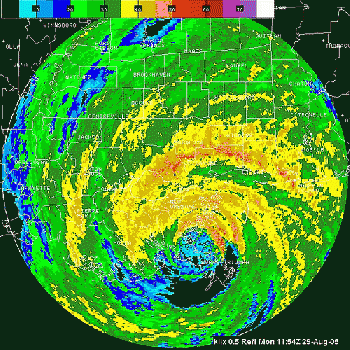11 September 2017
After devastating islands in the Caribbean, Irma made landfall Sunday in the United States as a Category 4 hurricane, pummeling the Florida Keys with 130 mph winds and inundating the low-lying islands with up to 10 feet of storm surge.
The 400-mile-wide storm has engulfed the entire state as it makes its way up Florida's western coast, slamming into the Tampa area as a Category 2 hurricane around midnight. Miami, in the southeast, saw unprecedented flooding as the storm brought major storm surges to both sides of the peninsula.
As of this writing, at least 26 people have been killed by the storm, with four fatalities already recorded in Florida. The total is expected to rise as the scope of the damage left in Irma's wake is surveyed. Initial estimates indicate that Irma could leave behind $200 billion in damage, greater than that done by Harvey.
Hurricane Irma is a mass event. The storm will eventually impact the lives of tens of millions, including the friends and family of those directly impacted. More than 6.5 million people are under evacuation orders in Florida and another 570,000 in Georgia. Approximately 116,000 people are waiting out the storm in emergency shelters. Thousands of hotel rooms have been booked up in inland Florida and for hundreds of miles north of evacuation zones.
Such major calamities expose the basic structures of social and political life in a particularly stark form. Both Irma and Harvey before it have revealed a country riven by social inequality, plagued by decaying infrastructure and presided over by a ruling elite that acts with criminal indifference when confronted with the basic needs of society.
Even as workers in Houston and the surrounding area confront the task of rebuilding with the most minimal assistance and no insurance, many of those facing Irma's rain and winds have not been able to leave. While issuing evacuation orders, government officials offered little or nothing in the form of aid. How many people have stayed behind because they were unable to afford the cost of gasoline or plane tickets, or could not get a seat on the severely limited number of buses and trains?
For those with automobiles, their exodus from the storm has been hampered by an absence of a plan for evacuation, with no effort made to efficiently mobilize crucial resources, including gasoline, or arrange places for people to stay. Many have been forced to seek out shelter wherever they eventually ran out of gas along the two highways north.
The abysmal state of infrastructure and rapid urban development have raised concerns about the potential for historic flooding and the integrity of public water systems. At least two million are currently without power, a byproduct of the fact that the US still uses overland power lines. Hundreds of thousands are expected to be without power for weeks.
There is a shift in the consciousness of broad sections of the population, which extends beyond the immediate issues at stake. Significantly, a World Socialist Web Site article published on Saturday, "Why aren't trains evacuating people from the path of Hurricane Irma?," has been shared tens of thousands of times on social media. It has been circulated widely because it asks a basic question that is not addressed anywhere in the media or political establishment.
Why shouldn't the resources of society be mobilized in a rational and organized way to meet a threat like Irma? To the use of train transport could be added the mass organization of bus and ferry transport, not to speak of the requisitioning of hotels and other accommodations to provide housing for those in need. It is not a question of a lack of resources, or to the extent that these resources are lacking, it is because they have been diverted to other aims.
For decades, the ruling elite has pursued a policy of social counterrevolution, looting public funds and clawing back all the gains made by working class over the last 100 years. Money that could have been allocated to develop infrastructure to counteract the impact of increasingly powerful and predictable storms has been funneled into the pockets of the rich at the expense of the working class and poor.
The American ruling class is incapable of planning anything, except the transfer of wealth and the buildup of a military that has been used to destroy one country after the next.
The response of the political establishment to Irma and Harvey has been to use them as a means of escalating the transfer of wealth. President Donald Trump used his weekly address on Saturday to connect storm recovery to the push to slash corporate taxes. The Democrats, meanwhile, have moved to form an alliance with Trump, the least popular president in history, to bolster an administration that has stumbled from crisis to crisis.
Whatever their differences, the political establishment is united on basic strategic issues. The ruling class is terrified of political instability sparking an economic crisis. Above all they fear the emergence of an independent working-class movement, and will do everything they can to prevent this.
(Note: You can view every article as one long page if you sign up as an Advocate Member, or higher).





